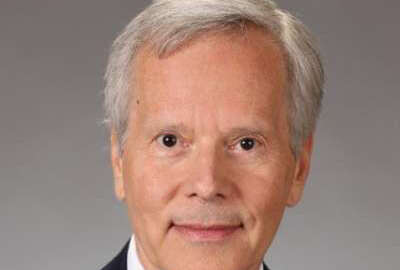
Which changes to the federal market are here to stay?
As the tumultuous 2020 reaches its final phase, contractors can expect some things to have changed for good, and the return of some of the old shibboleths.
Best listening experience is on Chrome, Firefox or Safari. Subscribe to Federal Drive’s daily audio interviews on Apple Podcasts or PodcastOne.
As the tumultuous 2020 reaches its final phase, contractors can expect some things to have changed for good, and the return of some of the old shibboleths. With a list of what to expect, federal sales and marketing consultant Larry Allen joined Federal Drive with Tom Temin.
Interview transcript:
Tom Temin: Larry, I want to begin with something that you’ve been saying and I think a few people have observed and that is even when the pandemic is ultimately over, it looks like it will be too, people will continue to telework in large numbers just cause there’s a lot of advantages to it. And if contracting officers, GSA people keep teleworking, that does have some effect on your sales and marketing effort as a contractor.
Larry Allen: Tom, telework is here to stay. You’re absolutely right. More and more agencies have said that. I was writing this week about a hearing before one of the Senate subcommittees last week which had the Department of Labor, Transportation and the Social Security Administration. Those are just three of the latest agencies and a steady stream that has talked about telework becoming the new normal, even after the pandemic goes away. And if you’re a government contractor, that not only changes how you sell, but it may even change what you sell, Tom. The needs of your federal workers are going to be different from what they were if they were in an office all of the time. And how you interact with those customers and prospects is going to change. And maybe, maybe you need to take a page out of your own book as a contractor to see how your company is acting differently, to understand a little bit about how your customer might be acting differently too.
Tom Temin: And then as we said in the beginning, some things don’t change. And let’s talk about the multiple award schedule program, which has changed a lot. But there are certain eternal truths about it concerning pricing, and so on. And it’s probably a good time to remind people about that as the year winds down.
Larry Allen: Well, Tom, in your intro, you started with the word shibboleth, which I think is a great example of what we’re talking about here. It’s been over 30 years since I first heard the term scheduled prices are too high. And then I heard it kind of out of the blue last week. I’m like really? We’re still on that? Because times have changed. There are abundant electronic commerce tools to ensure that agencies get competitive bids. The number of competitive bids received on the schedules program is up substantially over the last 30 years. Contracting officers at GSA have more tools to determine whether the pricing they’re getting on contract is a good price. They don’t now just look at a contractor’s own price, they look at other contractors selling similar things. And yet this old out of date image that scheduled prices are too high remains. My point is, look, this multiple award schedules program has stood the test of time. It has been here while other flavor of the month government contracting programs have come and gone. It’s still meeting a need today. It’s a fantastic low barrier to entry contracting program for small businesses. And it clearly meets the needs of government customers with between 35 and $40 billion a year in business generated annually. So that tells me it’s working well for somebody.
Tom Temin: Going along with that is that the government should ensure that what it’s asking for is really commercial. Remember, when you mentioned in the first Bush administration when they were worried about PC prices, people would thumb through computer shopper and say, well look, look how much this is here, this great big telephone book that came out every couple of months. And of course, what the government was buying was often so much more specified than what was in computer shopper that you really weren’t buying the same thing.
Larry Allen: That’s right. Specifications change, but also sourcing changes. Simply put Tom, some of the products that were available to commercial users in computer shopper aren’t available to the government. And what could take us into a day long discussion of cybersecurity and secure chain supply chain management, but your basic point is a good one. When you’re a government buyer, you want to make sure that you’re doing an apples to apples comparison. And if you feel that your price whether it’s on schedules or another IDIQ contract, might be higher than it should be. Look to the FAR, the Federal Acquisition Regulations say right there that you should always ask the contractor for a price reduction when you’re buying through any type of IDIQ contract.
Tom Temin: And last time we spoke we talked about being transparent. And if the government asks you for information, go ahead and give it. In this case, you’re saying GSA oughta go ahead and ask industry for some input, and it may have missed a chance to do that recently.
Larry Allen: I think it did, Tom. And it’s ironic that we are talking about this, again, albeit bound from a different side of the tennis net. I did take industry to task recently. And I think appropriately so when GSA or any other government agency is asking contractors for input to put together a good acquisition, industry oughta put it together and give it to the government that just makes for a better acquisition process. Similarly, though, when the government is in front of groups of industry people, particularly those that comprise a large part of your program, it’s good to be forthcoming with them. Be open, be upfront about what your plans are. tell people what it is you’re thinking about doing and why — own the research that you’ve done to date on your approach to a particular acquisition problem, and get the feedback. Look, the feedback may not all be 100% positive. But that doesn’t mean it’s not going to be valuable. You want to make sure that you’ve got a great acquisition program. And one of the ways to do that is to make sure that you’re actually aboveboard, open, telling government people what they need to get from you. But if you’re in government, you’re telling government customers what you’re planning to do, so that they can provide the input they need to.
Tom Temin: And a final question, we’ve got a new Congress that’s about to come in. And there are some new members, quite a number of new members, a lot of seats changed hands this time around, and there’s going to be a new administration, we’re going to see some very familiar names, I think we can all bet on that. But maybe some new names also. And when it comes to procurement, this is a good time as you put it to stick together and give a united story about what federal procurement is all about to some of these newbies.
Larry Allen: Tom, that’s right. What we’re gonna see is what we see kind of every four years, sometimes more than others. But this year, right now is a time for people in the acquisition field to know who they are, to know what their processes are, and to know why they’re taking certain action. Whether it’s using other transaction authority, whether it’s putting in a new requirement for source selection competition, whatever it is. The good news, bad news story about government acquisition is that on the average day, not too many people pay attention to government acquisition. So not that many people know the details. The bad news story is when something goes wrong, Capitol Hill instantly has 535 experts in government acquisition, some of whom would like to change program in ways that it probably can’t actually be bent. Thinking about 100% domestic sourcing, which is going to be something that we deal with in 2021 for at least some types of things the government buys. In the acquisition community, we have to realize that while we squabble internally, this is not the time to squabble internally. This is the time to make sure that we are able to tell our good news story tell our reasons for why we do things, tell what our plans are to the people who are coming in, because some of them are going to have their own ideas and they’re going to want to take acquisition in a direction that ultimately doesn’t serve anyone well. We’re the acquisition experts, we ought to be prepared to tell our story and why we think our way forward is worth taking a look at
Tom Temin: Larry Allen is president of Allen Federal Business Partners. Thanks so much.
Larry Allen: Tom, thank you and I wish your listeners happy selling.
Copyright © 2024 Federal News Network. All rights reserved. This website is not intended for users located within the European Economic Area.
Tom Temin is host of the Federal Drive and has been providing insight on federal technology and management issues for more than 30 years.
Follow @tteminWFED
Related Stories

Pandemic upends solicitation by the Federal Housing Administration




